4 Sep 2024
Updated on January 30th, 2025
The Ultimate Guide to Healthcare CRM Software Development: Enhance Patient Care
Matthew Connor
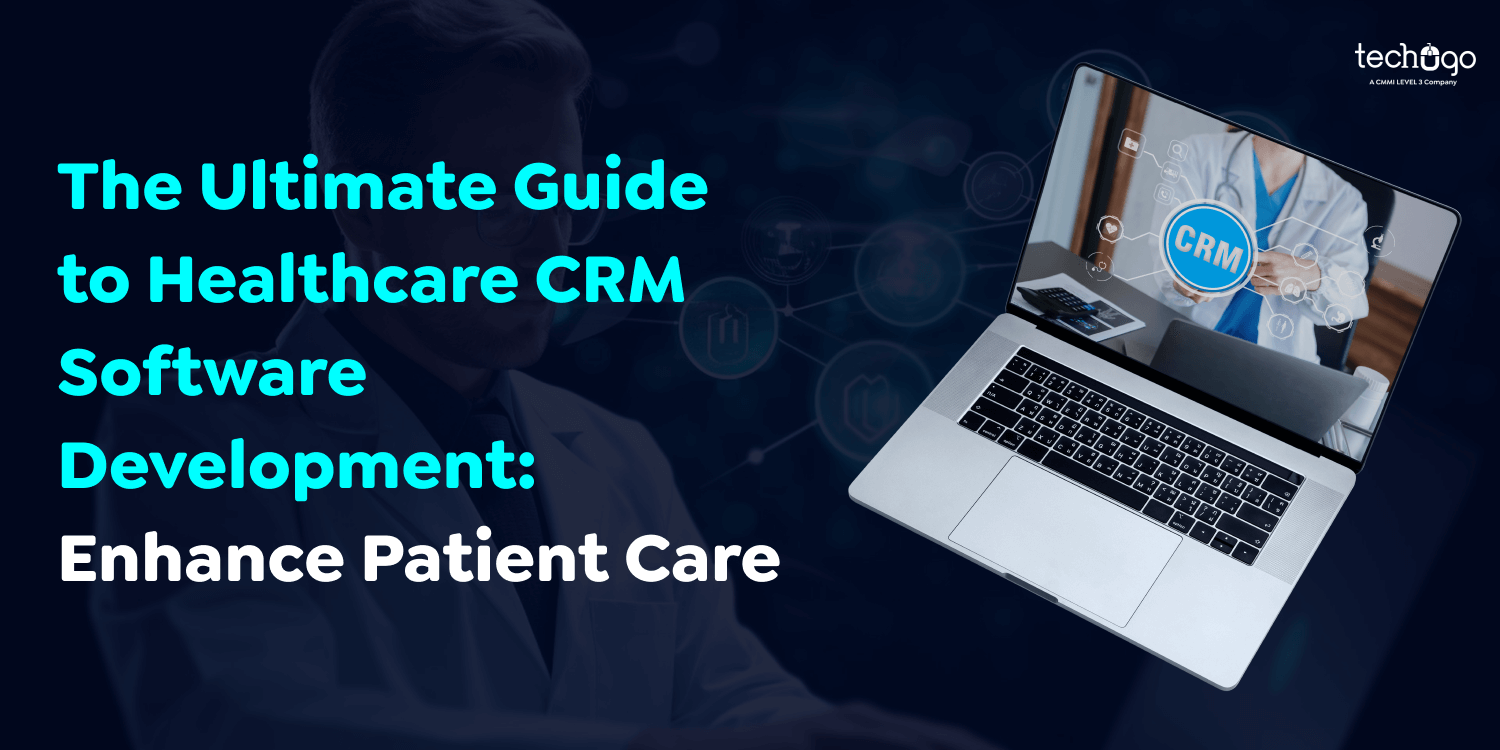
Customer relationship management (CRM) in healthcare empowers medical institutions to improve their overall efficiency by setting measurable associations among different stakeholders—patients, team members, referrals, and providers. This leads to lowered costs, optimized medical services, and an improved patient experience.
According to research, the global healthcare CRM software development market was esteemed at $17.9 billion in 2023 and is projected to achieve $30.7 billion by 2030. Key aspects pushing this shift include the increasing need for well-organized, effortlessly accessible data and the automation of enterprise operations. Additionally, digital conversion is affecting clinical protocol management, making modern clinical decision support systems, such as CRMs, required. Given the market’s potential and technological advancements, it’s no wonder that healthcare providers are increasingly pursuing healthcare CRM software development services.
This blog will walk you through the overview of healthcare CRM software development, summarising its primary advantages and vital features you may face. You’ll also learn why creating a custom healthcare CRM solution is a smart, long-term investment.
Understanding Healthcare CRM Software Development
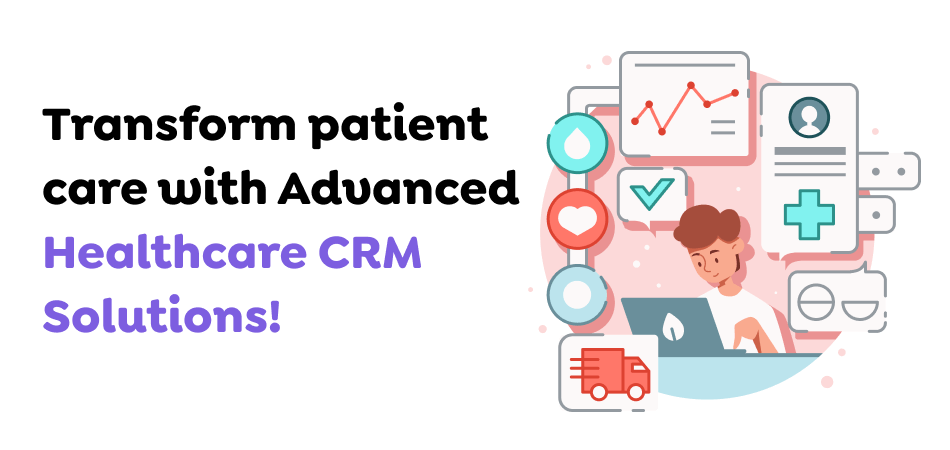
Healthcare CRM software development concentrates on constructing software solutions particularly developed to meet the distinctive requirements of healthcare organizations. These solutions aid in facilitating patient interactions, handling appointment schedules, tracking medical histories, and raising overall patient satisfaction. By utilising CRM systems, medical service providers can efficiently consolidate patient data, appointment management, and contact methods.
These CRM systems can automate everyday administrative tasks such as planning appointments and sending reminders, permitting healthcare staff to save more time to direct patient care. Moreover, CRM software promotes better cooperation and communication among healthcare experts, improving team coordination and detail sharing, which eventually leads to enhanced patient outcomes and greater patient satisfaction.
Healthcare CRM software development is geared towards improving the patient experience by combining various features. For example, it might have push notifications for arrangements or the ability to record conversations to comprehend patients’ preferred locations or times for appointments.
Now let’s discuss the different types of healthcare CRM solutions that can transform patient care and streamline administrative tasks.
Also Read: The Role of Mobile Apps in Canada’s Healthcare Industry
Different Types of Healthcare CRM Solutions

Here are some of the main types of healthcare CRM software that play a crucial role in enhancing patient care, optimizing administrative tasks, and improving overall healthcare management.
-
Patient Relationship Management CRM:
This type of CRM is centred on increasing the connection between the providers and their patients. It also helps in the coordination of the communication between the patient, the healthcare providers, and the bookings which in turn enhances the patient satisfaction and their compliance in the care that is being imparted to them.
-
Analytical Healthcare CRM:
Such CRM systems are intended to use the data to make informed decisions about the improvement of healthcare. Combining data from multiple sources like EHRs, analytical CRM solutions offer information about patient details, treatment efficacy, and resource utilisation, helping healthcare organization make better decisions.
-
Referral Management CRM:
Referral management CRMs are built for specific purposes to manage and enhance the process of referral in healthcare networks. These solutions help healthcare organization to effectively refer and transfer patients between different healthcare providers, and maintain proper communication between the referrer and the recipient hence improving the quality of care given.
-
Clinical CRM Solutions:
To cater for the needs of healthcare professionals in defining and managing clinical processes these CRMs are designed by incorporating Electronic Health Records (EHRs) in the process of healthcare CRM software development. They assist in coverage, paperwork, and timetables for patient care, making it easy for the healthcare givers to deliver quality, effective and efficient care.
Moving forward, let’s discover how developing CRM software for healthcare brings transformative advantages to patient care, operational efficiency, and data management.
Also Read: How AI is helping the entire healthcare industry
Advantages of Developing CRM Software for Healthcare
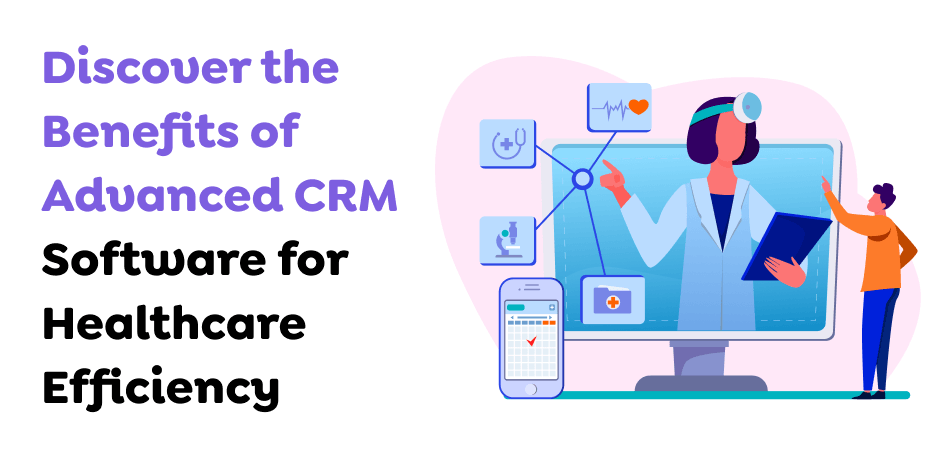
Healthcare institutions increasingly depend on CRM systems to achieve a more profound knowledge of their patients and optimize daily processes. Let’s analyse why CRM software is essential for the healthcare domain.
-
Minimizing Medical Errors:
Healthcare CRM solutions significantly reduce the occurrence of medical errors by providing healthcare providers with accurate and real-time patient information. With centralized digital records automated documentation and medication management processes, CRM systems help mitigate errors caused by unclear handwriting, miscommunication, or incomplete patient histories. By supporting thorough patient assessments and comprehensive treatment plans, CRM technology enhances clinical decision-making and boosts patient safety, reducing adverse events and medical errors within healthcare facilities.
-
Enhancing Patient Engagement:
CRM software for the healthcare industry improves the power to interact with patients in a better manner, lowers the communication gap, and enhances operational performance in providing better healthcare services. Features like patient portals, online appointment scheduling, and secure messaging empower patients to take an active role in handling their health, guiding them to higher satisfaction and adherence to treatment plans. Additionally, CRM tools allow proactive outreach, such as automated appointment reminders and follow-up contacts, guaranteeing patients feel supported and respected throughout their healthcare journey.
-
Ensuring Data Security:
An advantage of CRM systems within the healthcare industry is the capacity to protect the privacy of patients’ information. Using security measures, which are encryption, access control, and audit trails, these platforms shield patient information from dilemmas such as illicit access or internet threats. HIPAA, for instance, forms the basis of a sound legal framework for the protection of patients’ data, thus helping the healthcare CRM systems to develop and uphold a source of confidence in the industry.
-
Streamlining Patient Data Management:
CRM solutions in health care involve the aggregation of patient information from different sources including EHRs, diagnostic data and treatment plans in one accessible application. This kind of centralization enables healthcare providers to gain summarized patient information within the shortest time possible, thus enabling efficient and effective healthcare decisions. From the aggregation of data, the use of CRM systems reduces data duplication and improves the quality of information available and readily accessible about the care of the patient.
-
Improving Hospital Workflow Efficiency:
Healthcare CRM development enhances the work process of the hospital through the automation of administrative tasks as well as the management of resources. Some of the useful features include automatic appointment booking, inventory management, and staff scheduling, all of which improve healthcare facility operations, decrease patient waiting time, eradicate operation hold-ups, and increase productivity. Through automating several operations, the CRM software provides efficient work performance and lets healthcare staff spend more time with patients.
-
Gathering and Utilizing Patient Feedback:
The use of Health care CRM systems aids in patients’ feedback thus enabling healthcare facilities to assess the quality of their services regularly. Through satisfaction and other feedback questionnaires as well as patients’ feedback forms, the CRM software generates information on patient experiences, preferences, and pain points. It ensures that healthcare providers get to realize patterns and customer complaints and channel them to formulate techniques for increasing patient satisfaction, patient fidelity, and consequently patient retention in the process of improving the delivery of healthcare services.
Let’s explore the essential features to include in healthcare CRM software development.
Also Read : What Exactly is Virtual Healthcare? What Makes it Different From Telehealth?
Essential Features to Include in Healthcare CRM Development
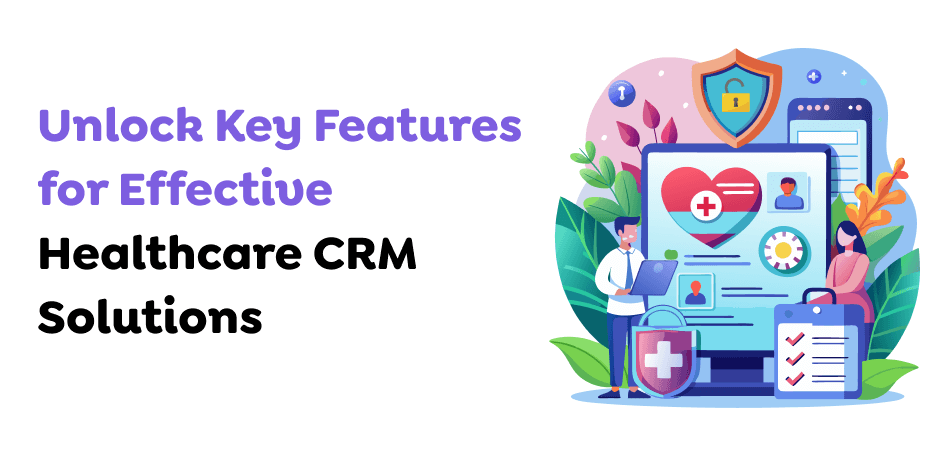
To maximize the benefits of healthcare CRM solutions, it’s crucial to integrate the following key features.
-
Patient Information Management:
This feature involves managing and supporting patient demographics, medical histories, and contact details in a centralized, easily available database. It facilitates administrative processes such as patient registration and information recovery, guaranteeing that healthcare providers have quick access to vital patient data during consultations and medical appointments.
-
Streamlined Appointment Booking:
Scheduling of appointments is a critical aspect in managing patient access, the use of resources and the possibility of schedule clashes. Some of the additional capabilities of such systems can be a notification for the next appointment, a list of patients waiting for the healthcare provider, and integration with the provider’s calendar.
-
Enhanced Communication Channels:
The CRM systems in healthcare must enable safe and efficient communication channels between patients, clinicians as well as employees. It encompasses a messaging system, video consultancy, and virtual office for the patient to review their records set up appointments and interact with their healthcare providers. These tools promote the involvement of the patient, facilitate the communication between the patient and healthcare facilities and also promote the bond between the patient and doctors.
-
Task Coordination and Management:
Task management features are required to provide teams of healthcare workers with the necessary tools for sorting through the patient’s tasks and administrative responsibilities and also use templates for follow-up. Some of the functional requirements may be represented as the facility for task reminders, delegation possibilities, and the ability to control personal and team progress to guarantee the prioritizing of important tasks and focus on patients’ needs.
-
Data Analytics and Reporting: Business intelligence:
and reporting tools enable organizations within the healthcare industry to have efficient tools in their strategic planning, assessment of their performance, and enhancement of the quality of the services being offered. It is these features that allow the generation of such customized reports and analysis of key performance indicators. These tools are in this way beneficial in providing appropriate information that will assist in advancing the processes in the healthcare setting and consequently advancing the quality of care being provided.
-
Seamless Integration with Other Systems:
Connectivity features are crucial to enable the outer link of the healthcare CRM solution to operative EMR solutions, the billing system, and other third-party apps. These integration features make the data transfer between these systems simple hence improving the coordination and compatibility of the overall health management systems.
Now let’s learn the essential steps to developing healthcare CRM software, from initial planning to deployment and ongoing support, to ensure a successful implementation.
Steps to Developing Healthcare CRM Software
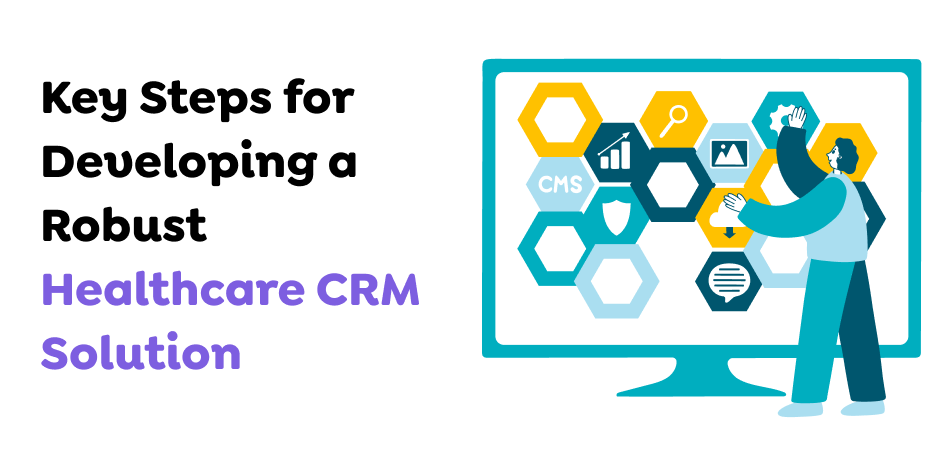
Building a healthcare CRM system can follow various methodologies, but utilizing the Agile model within the Software Development Life Cycle (SDLC) is a common and effective approach. Here’s a step-by-step guide to help you through the process.
1. Selecting a Technical Partner
The initial step in healthcare CRM development involves finding a trustworthy software development company like Techugo with experience in the healthcare sector. Look for a development firm that offers specialized healthcare software development services. Evaluate potential partners by examining their expertise in healthcare, reviewing their portfolio of past projects, understanding the technologies they use, and reading client testimonials on platforms. Ensuring the company has a solid track record in healthcare projects is essential.
2. Defining Project Requirements
This phase, often referred to as the Discovery Phase, focuses on understanding the project’s needs. Business analysts will delve into your CRM concept, identifying business objectives, target demographics, and market positioning. They will then create a detailed project specification document outlining the desired features, security measures, integration needs, technology stack, and other essential components for healthcare CRM software development. The CRM’s functionalities should align with your organization’s goals and aid in achieving them.
Choosing the right software architecture is also crucial at this stage. Cloud-based architecture is frequently recommended by experts for modern healthcare solutions due to its scalability and ease of integration with various data sources, making it ideal for complex CRM systems.
3. Designing UI/UX and Creating Prototypes
The design phase involves creating user-friendly interfaces by focusing on essential user interactions, such as patient data segmentation and report generation. The design team follows a user-centric approach to ensure a smooth user experience:
- Focusing on User Needs: When designing interfaces, designers take into consideration what the end-user would prefer to see and what is the ‘thinking’ path that the end-user would want to follow.
- Minimizing Steps to Complete Tasks: Interfaces are arranged to allow users to execute similar activities in the shortest time possible to make the interaction of users with the CRM system easier.
- Prioritizing Key Information: Appointment and lab information always exist on the operating room desk, but frequently searched information such as the schedule of the day is put on the front screen of the main system to support the workflow.
4. Development, Integration, and Quality Assurance
This phase perhaps takes the longest time to execute and is the most vital because this is where the actual development of the healthcare CRM system is done. Software engineers cover both the front and the back end to include any needed APIs into the recipe to enable efficient communication with other apps. The newly developed CRM system has to be compatible with current info solutions in the sphere of healthcare to provide complex services for business processes and use the synergistic effect to enhance profitability.
Quality assurance teams perform extensive manual and automated testing to validate that the CRM meets all functional requirements. Testing assists in meeting the set security standards and legal requirements. This involves; making sure that the healthcare CRM is fully integrated, tested, and secure before it is deployed finally with the project’s specifications.
5. Deployment and Ongoing Support
The final stage of the development life cycle is deployment, where after the development and testing of the CRM solution is completed it is deployed for use. It is presented to the target user and other consumers to actualise the function of satisfying the demands of various stakeholders. Moreover, some changes are effected to smoothen up the system as per the details collected from the clients. Healthcare CRM systems are intricate in design, and this means that there is always a need to update, enhance and maintain. Regular updates from the development team help ascertain that the CRM continues to be useful as it was at the time of creation while the security checks for the system as well as the changes in compliance requirements protect the CRM from growing threats and any new set of regulations.
Thus, it will be possible to adopt these steps that will help to develop a CRM solution within healthcare organizations improve patient satisfaction, and streamline internal processes.
In A Nutshell!
In conclusion, investing in healthcare CRM software development is a strategic conclusion that can greatly boost patient care and facilitate healthcare operations. By embracing a tailored CRM solution, healthcare organizations can effectively handle patient relationships, improve communication, and optimize administrative processes. The rich features of a well-developed CRM system not only enhance patient engagement and data security but also push operational efficiency and informed decision-making. As the healthcare sector persists in adopting digital transformation, a customized CRM solution becomes necessary for gaining long-term success and sustaining a competitive edge in the evolving market.
Get in touch with us today to start your journey towards innovation and excellence.
Get In touch
We are excited to here from you and let’s start something special Together. Call Us for any inquiry.
Write us
sales@techugo.caJust a call away
About you




